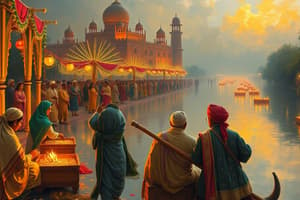Podcast
Questions and Answers
What is the primary purpose of festivals in various communities?
What is the primary purpose of festivals in various communities?
- To showcase the richness and complexity of different cultures
- To promote local produce and specialties
- To celebrate and honor religious and historical events (correct)
- To provide an opportunity for people to engage in traditional activities
What is the significance of the Chinese New Year in China?
What is the significance of the Chinese New Year in China?
- It marks the arrival of winter and the end of harvest
- It honors the triumph of good over evil
- It highlights the output of producers from a certain region
- It celebrates the arrival of a new year and the start of spring (correct)
What is the festival of Holi in India celebrating?
What is the festival of Holi in India celebrating?
- The start of winter and the end of harvest
- The output of producers from a certain region
- The arrival of spring and the triumph of good over evil (correct)
- The richness and complexity of different cultures
What is the focus of the Galway International Oyster Festival in Ireland?
What is the focus of the Galway International Oyster Festival in Ireland?
Which country has a festival dedicated to wine, known as the Soweto Wine Festival?
Which country has a festival dedicated to wine, known as the Soweto Wine Festival?
What is the name of the festival in the United States dedicated to peanuts?
What is the name of the festival in the United States dedicated to peanuts?
What is the primary purpose of food festivals?
What is the primary purpose of food festivals?
What is the main aspect of traditional celebrations during festivals?
What is the main aspect of traditional celebrations during festivals?
What is the significance of the ceremonial keşkek in Turkish cuisine?
What is the significance of the ceremonial keşkek in Turkish cuisine?
What is the outcome of participating in festivals?
What is the outcome of participating in festivals?
What is the Boryeong Mud Festival in South Korea known for?
What is the Boryeong Mud Festival in South Korea known for?
What is the diversity of festivals around the world?
What is the diversity of festivals around the world?
Study Notes
Festivals: Cultural Significance, Food and Drink, and Traditional Celebrations
Festivals are an integral part of various communities, often centered around aspects of religion, culture, and traditions. They are celebrated worldwide and provide an opportunity for people to come together, eat, drink, and engage in traditional activities.
Cultural Significance
Festivals serve as a way to celebrate and honor religious and historical events, often having deep cultural and religious significance. For example, the Chinese New Year is one of the most important holidays in China, celebrating the arrival of a new year and the start of spring. In India, Holi is a festival of colors celebrated in March, marking the arrival of spring and the triumph of good over evil. The diversity of festivals around the world showcases the richness and complexity of different cultures, providing a window into their traditions and values.
Food and Drink
Many festivals revolve around food and drink, often focusing on local produce and specialties. For instance, the Galway International Oyster Festival in Ireland highlights the output of producers from a certain region, while Oktoberfest in Germany is famous for its beer. In the Philippines, there are numerous festivals dedicated to food and drinks, including the Soweto Wine Festival in South Africa and the National Peanut Festival in the United States. Food festivals offer a unique opportunity to taste traditional dishes and experience the culinary heritage of a region.
Traditional Celebrations
Traditional celebrations during festivals often involve music, dance, and art, showcasing the creativity and artistic expression of a community. For example, the Boryeong Mud Festival in South Korea is a unique event that involves mud wrestling, mud sliding, and mud bathing, celebrating the cosmetic benefits of the mineral-rich mud from the Boryeong region. In Turkey, the ceremonial keşkek is a stew found in Turkish, Iranian, and Greek cuisines, usually associated with a ceremonial or religious occasion and cooked by groups of men and women together in the community. These traditional celebrations often have a strong communal aspect, bringing people together to participate in the festivities.
In conclusion, festivals are an essential part of many cultures, offering an opportunity to celebrate traditions, food, and drink. They provide a platform for communities to come together, share experiences, and strengthen their cultural identity. Whether it's a religious festival, a food festival, or a traditional celebration, festivals are a vibrant and exciting way to experience the diversity and richness of different cultures around the world.
Studying That Suits You
Use AI to generate personalized quizzes and flashcards to suit your learning preferences.
Description
Festivals are an integral part of various communities, celebrating cultural, religious, and historical events. They offer a unique opportunity to experience traditional food, drinks, and celebrations, showcasing the diversity and richness of different cultures. From the Chinese New Year to Oktoberfest, festivals bring people together, strengthen cultural identity, and provide a window into traditions and values. Test your knowledge of festivals from around the world!




